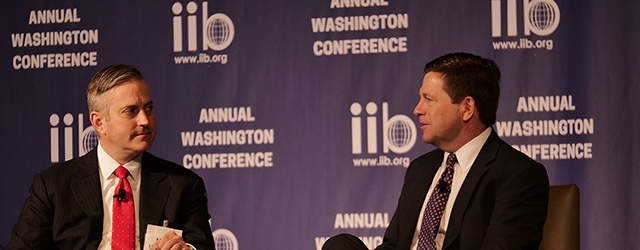At the 30th annual Institute of International Bankers conference in Washington, D.C., US regulators expressed concerns about the impact of Brexit on markets and derivatives trading as the March 29 article 50 deadline looms.

“There is a tremendous amount of uncertainty that has been eliminated, but there remains a tremendous amount of uncertainty, especially in case of a hard Brexit,” the chief of the Security and Exchange Commission (SEC) Jay Clayton told Global Finance on the sidelines of the 30th annual conference of the Institute of International Bankers (IIB) in Washington, DC. Clayton fears thata hard Brexit scenario would cause price volatility in the markets and noted that there are unresolved issues still on the EU-UK negotiating table.
The impact of Brexit on derivative markets, overnight clearinghouses and the Libor rate were major concern expressed by US regulators speaking at the two-day conference.
Clayton’sremarks came as the UK Parliament prepares to vote for a second time on Prime Minister Theresa May’s agreement to leave the EU. British MPs, who rejected the plan in January, could approve the deal, reject it again or vote to postpone the impending divorce. The UK is scheduled to leave the EU, with or without a dealby March 29, unless Parliament pushes the deadline back.
“Within a range of Brexit outcomes, there are some outcomes that are very worrying,” Clayton said. “Our mandate is to ensure fair price discovery; we are going to have volatile price discovery if we have hard Brexit,” said the SEC chair, referring to the process between buyers and sellers of determining the price of an asset in the market. Clayton said the conversation betweenEU and UK counterparts continues “all the time.”
The uncertainty of Brexit has additional implications for international securities trading.
Christopher Giancarlo, chairman of the Commodity Futures Trading Commission (CFTC), said his institution formed a Brexit task force one year ago to monitor the impact of Brexit on derivatives markets.The CFTC is concerned that Brexit could fragment the multi-trillion dollar trade.
“As we now move toward Brexit whatever form it takes, we will remain focused both on the short-term implications on clearing contracts but more broadly we are very focused on where that services center continues to reside,” Giancarlo told the audience of international bankers and lawyers.“That is so important to support lending and healthy market activity. We need to make sure that the infrastructure remains intact.”
Giancarlo welcomed a recent agreement with the Bank of England to ensure the continuity of derivatives trading and clearing activities between the UK and the US.
The CFTC chairman expressed concerns over EU proposals to supervise non-EU central clearing counterparties (CCPs). Most EU derivatives-clearing takes place in the UK and the CFTC opposes potential interference of EU regulators of UKclearinghouses in the aftermath of Brexit.
“We have been quite clear about the application of [EU] law on [non-EU] clearinghouses. It would be highly problematic if not possible,” Giancarlo said.
“We are traveling in different directions right now. Conversations with our colleagues are open and candid,” the CFTC chairman said.“We have exchanged correspondence. And we will have many more conversations to come.”



